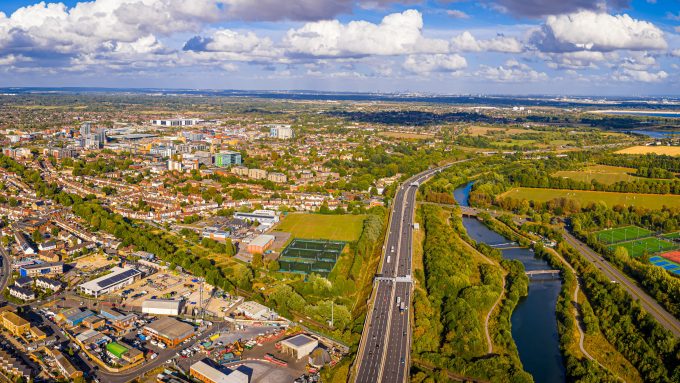
Meet the academic powering change in the energy sector

“I want to be inspired by the younger generation,” says Dr Weiqi Hua who is mentoring not one, not two, but ten PhD students involved in clean energy research.
“It’s similar to Olympic sport, where the young academics are the stars who continue innovating, and have the creativity to inspire older people like me.”
Weiqi is an assistant professor in energy systems within the University of Birmingham School of Engineering. He is developing several pieces of research including a look at machine learning and digital twins to simulate local energy systems to help with service operation and the planning of infrastructure upgrades.
Another area of study involves better understanding the interplay between economics and energy policies, including emissions trading schemes.
He is also currently participating in an international academic exchange with DIATOMIC in the West Midlands – led by Connected Places Catapult – to further the development and partnership of digital innovation between the cities of Birmingham and Ulsan. The project builds on the UK-Republic of Korea Innovation Twins programme led by the Catapult.
“Several of my students looking at energy systems have backgrounds in economics, finance, data analytics and computer science – completely different from my background in engineering – but it’s inspiring to consider completely different solutions to a problem.
“I encourage my students to explore the topic widely, give them guidance and make suggestions,” he adds. “But their feedback also empowers my research.
“No single problem in the real world can be solved by a single approach. Take net zero: that definitely cannot only be achieved just by engineers; we need the social scientists, finance experts and computer specialists to all work together.”Dr Weiqi Hua, assistant professor in energy systems, University of Birmingham School of Engineering
Driving forward with smart grid research
Weiqi joined the University of Birmingham two years ago after completing postdoctoral research at both Cardiff and Oxford universities, and a PhD in engineering from Durham in 2021. There, he was sponsored by the Hyundai Motor Company to carry out research into the development of smart grid technology, that considers the use of a data-driven approach to better understand both national trends and consumer expectations around energy systems.
His current focus is exploring how the UK’s energy system can best transition towards clean power by 2030, decarbonisation of the energy sector by 2035 and achieving net zero by 2050, in particular for power systems (eg rooftop solar panels), heating (such as ground source heat pumps), and transportation (electric vehicles) – and community integration of hydrogen.

Weiqi says the energy sector needs “to move faster and earlier” to achieve these policy targets, especially to help harder to decarbonise sectors such as industrial heating and aviation. “It’s likely we can achieve this target, but there's still some technical, societal and economic barriers,” he says. “We also need whole-system thinking and a place-based approach to energy that recognises the availability of resources in different areas.
“There is a real need for co-ordination between different sectors,” Weiqi explains. “My research focuses on socio-economic factors, and I also want to consider decision making and the role of different stakeholders.
“But most importantly, I want to involve consumers. A data-driven, digital approach can analyse their decision making, better understand why they make the decisions they do and align their needs with energy systems to help achieve environmental targets. Understanding and analysing specific behaviours can provide energy scheduling scenarios to support their decision making.”
Feedback captured from stakeholders could then be used to develop a visual platform for the digital twin model to help highlight different renewable investment scenarios and show how consumers’ decisions could help reduce their energy bills, he adds.
Furthering his understanding in Ulsan
As part of the DIATOMIC academic exchange programme, Weiqi visited South Korea in February where he revisited Hyundai which sponsored his PhD a decade ago. The focus of his trip was to explore how digital-based energy solutions can be developed and how best to overcome interoperability and data sharing challenges.
He and the UK delegation also visited the Ulsan Technology Park to see how hydrogen was being produced, stored, used and integrated into the region’s energy network.
“Connected Places Catapult has been very supportive in helping to connect me with researchers, local authorities and industrial partners in South Korea through the DIATOMIC programme,” he says. Energy Systems Catapult also provides support through the Researcher in Residence programme to develop place-based digital solutions in the electricity, heating, transport and socioeconomic sectors.
Weiqi was born in northern China and studied environmental engineering before moving to Durham University to take a Masters in new and renewable energy. He remembers coal fired power stations on the horizon that led to air pollution, and thinking there needs to be a better way of producing energy.
Now, he says, China is one of the largest manufacturers of solar panels and is making big investments in growing its electric vehicle capabilities.

At Cardiff University, he developed a blockchain platform designed to let residential energy customers share energy with each other; and his time at Oxford involved a project to illustrate to people how much money and carbon they could save by replacing gas boilers with heat pumps.
And in 2023, he made it onto Forbes magazine’s ‘100 Most Influential Chinese’ list in recognition of his research into energy and low carbon futures.
Recent projects have made Weiqi more aware of the importance of social science in research, and to find better ways to communicate with those who are not technically minded using visualisation platforms to show the results of making a switch.
Weiqi says the DIATOMIC programme has also made him appreciate the “talented young generation” for being energetic and creative.
“My ambition is to found my own enterprise and develop my own technologies,” he adds. In the meantime, success for him would mean producing research that becomes recognised around the world, and for helping to accelerate progress on environmental issues “that cannot be solved by any single country or any single sector”.
Read more about the DIATOMIC programme, and the UK-Republic of Korea Innovation Twins programme.





